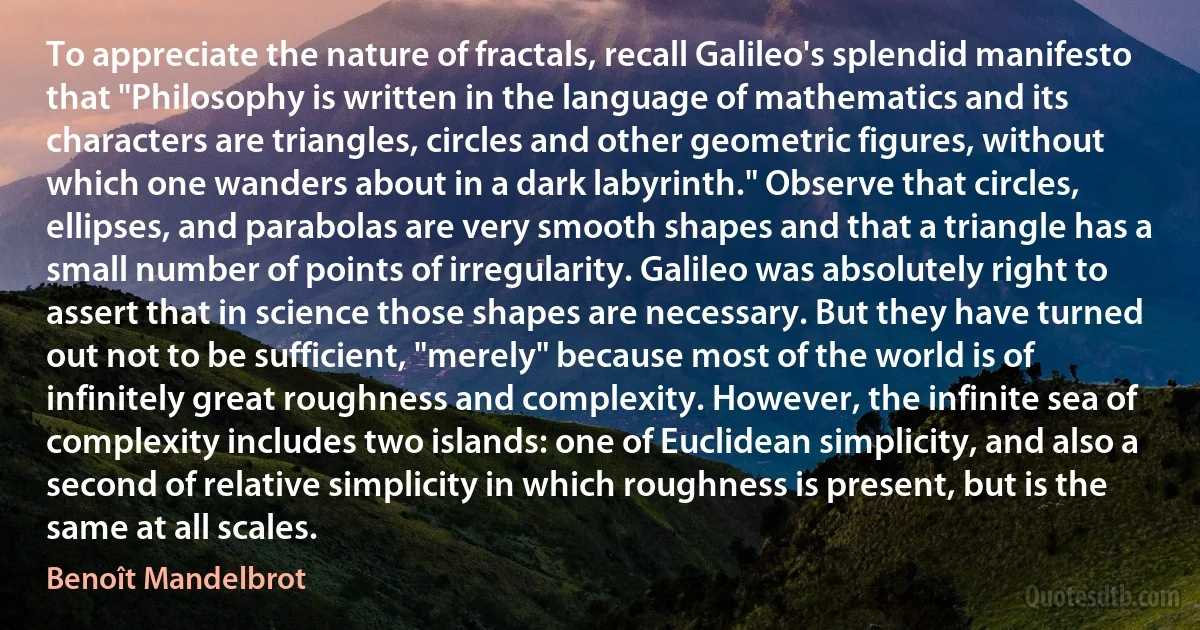
To appreciate the nature of fractals, recall Galileo's splendid manifesto that "Philosophy is written in the language of mathematics and its characters are triangles, circles and other geometric figures, without which one wanders about in a dark labyrinth." Observe that circles, ellipses, and parabolas are very smooth shapes and that a triangle has a small number of points of irregularity. Galileo was absolutely right to assert that in science those shapes are necessary. But they have turned out not to be sufficient, "merely" because most of the world is of infinitely great roughness and complexity. However, the infinite sea of complexity includes two islands: one of Euclidean simplicity, and also a second of relative simplicity in which roughness is present, but is the same at all scales.
Benoît MandelbrotRelated topics
complexity dark ellipsis great irregularity labyrinth language manifesto mathematics nature necessary number observe present right roughness science sea second small smooth triangle world write galileo pointsRelated quotes
A line cannot control pictorial space absolutely. A line may flow freely in and out space, but cannot independently create the phenomenon of push and pull necessary to plastic creation. Push and pull are expanding and contracting forces which are activated by carriers in visual motion. Planes are the most important carriers, lines and points less so.. .the picture plane reacts automatically in the opposite direction to the stimulus received; thus action continues as long as it receives stimulus in the creative process. Push answers with pull and pull with push. ... At the end of his life and the height of his capacity Cézanne understood color as a force of push and pull. In his pictures he created an enormous sense of volume, breathing, pulsating, expanding, contracting through his use of colors.

Hans Hofmann
The worst thing that can happen to advanced devotees who are fixed in Krishna consciousness is that they will go back to the spiritual world. Thus, they are enabled by calamitous situations to go back to Krishna more quickly. It is a part of the process of devotion that from time to time everyone must be tested in various ways. When we take to devotional service we are declaring war against Maya. We are on a battlefield, engaged in our own battle of Kuruksetra. We shouldn't read the Bhagavad-gita and think that it is merely some fascinating ancient history and philosophy. We should also understand that Arjuna is representing every person who is trying to take shelter of Krishna. Arjuna had to undergo bewilderment and serious choices, but Krishna was present to protect him.

Bhakti Tirtha Swami
Let us not despair; it is a blessed cause, and success, ere long, will crown our exertions. Already we have gained one victory; we have obtained, for these poor creatures, the recognition of their human nature, which, for a while was most shamefully denied. This is the first fruits of our efforts; let us persevere and our triumph will be complete. Never, never will we desist till we have wiped away this scandal from the Christian name, released ourselves from the load of guilt, under which we at present labour, and extinguished every trace of this bloody traffic, of which our posterity, looking back to the history of these enlightened times, will scarce believe that it has been suffered to exist so long a disgrace and dishonour to this country.

William Wilberforce
I gave up on this stuff. I gave up on my species and ... I gave up on my countrymen. Because I think we squandered great gifts. I think humans were given great great gifts: walking upright, binocular vision, opposable thumb, large brain ... We grew. We had great gifts, and we gave it all up for both money and God ... We gave it all up to superstition, primitive superstition, primitive shit ... Invisible man in the sky, looking down, keeping track of what we do, make sure we don't do the wrong thing, if we do, he puts us in hell, where we burn forever. That kind of shit is very limiting for this brain we have. So we keep ourselves limited. And then we want a toy and a gizmo and gold and we want shiny things, and we want something to plug in that will make big big big things for us... And all that shit is nothing! It's nothing.

George Carlin
For what advantage is it, that the world enjoys profound peace, if thou art at war with thyself? This then is the peace we should keep. If we have it, nothing from without will be able to harm us. And to this end the public peace contributes no little: whence it is said, ‘That we may lead a quiet and peaceable life.' But if any one is disturbed when there is quiet, he is a miserable creature. Seest thou that He speaks of this peace which I call the third (inner, ed.) kind? Therefore when he has said, ‘that we may lead a quiet and peaceable life,' he does not stop there, but adds ‘in all godliness and honesty.' But we cannot live in godliness and honesty, unless that peace be established. For when curious reasonings disturb our faith, what peace is there? or when spirits of uncleanness, what peace is there?

John Chrysostom
